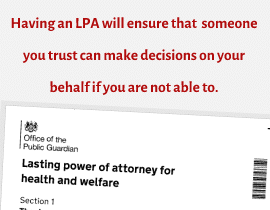Professional Executor Service
Templar Estate Planning’s professional executor service is part of our package of options designed to give you peace of mind and to help your loved ones at the time of your death.
Contact us today to find out more about how our service can help you.
What is an Executor?
When writing a Will, you will state who it is you want to execute your Will on your death. The person or persons appointed are called the Executor. It is your choice who you appoint, often a spouse or child is appointed either on their own, or with the help of a professional service, friend or another family member.
An Executor has to carry out certain tasks and duties in order to legally fulfill the obligations of the task of executing the Will and your wishes within it. Depending on the size and complexity of your Will, there are many tasks to carry out or be organised with other family members, these include:
- Applying for Probate (where necessary)
- Obtaining a copy of the medical certificate indicating cause of death and a formal notice from the Doctor
- Registration of the death at the Local Registry of Births, Deaths and Marriages. The death must be registered in order to obtain the Death Certificate. NB. it is advisable to get more than one copy as it will be needed when dealing with Insurance Companies, Banks, Pension Providers etc
- Ensure any last wishes such as organ or body donations are carried out. The job might also include planning for the Funeral or Cremation and arranging for payments for the services provided
- Making sure you have the last original Will of the Deceased and not an old version
- Location of all the heirs and beneficiaries. This might seem like an easy task and probably is if there are just a couple of children and they are the only ones named in the Will. If there are numerous beneficiaries named in the Will, either collectively or individually, the Executor must locate each and every one
- Make a full list and valuation of all the assets and liabilities of the estate. For assets, this might include property, bank accounts, investments, shares, pensions, life insurance policies. Liabilities might include credit cards, utility bills, loans, car debts, council tax, personal tax and more
- If the deceased had foreign property, it becomes even more complicated
- Open a separate executor bank account into which money collected can be deposited. This will prevent estate monies being confused with personal finances
- Notify all businesses of the death e.g. Utility Companies, Credit Card Companies, Banks, Council Tax Offices, Social Security etc
- Make sure that all the Deceased’s debts are settled before the estate is distributed to the Beneficiaries
- If there are minor or dependent children, the Executor could be responsible for arranging for their care and placement. The Deceased might have their wishes stated in the Will, but, if not, the Courts might need to be involved in the placement and guardianship of children
- If there are pets, the Executor will need to care for them and make arrangements for their continued care
- Pay any Inheritance Tax necessary
- Calculate and declare the value of the estate to HMRC on an Inheritance Tax return, within 12 months of death
- Pay the Deceased’s Tax. This your personal responsibility. Failure to submit an accurate account to HMRC may leave you open to personal liability or penalties
- Complete the relevant forms and submit them to the Local Probate Registry to obtain the Grant of Probate
- Distribute the contents of the Will, making sure that if anything is to be left to minors, a Trustee has been named
- After you have completed all of your tasks, you the Executor as administrator need to produce a full set of accounts for the Beneficiaries showing the estate assets and liabilities, administration income and expenses and how the estate has been distributed
- If the Executor forgets to settle a liability before distributing the assets, he or she will be personally liable for the debt. So it is important mistakes aren’t made
Acting as an Executor is a tough job – carefull consideration needs to be given as to who to appoint:
- Being an executor is a difficult and time-consuming job.
- The role carries personal and legal liability.
- Relatives may be too distressed to perform the role.
- Devisions could make them unpopular with beneficiaries.
What are the benefits of having a Professional Executor?
The obligations and tasks for an Executor can be achieved by the average person, however, it is a big responsibility, can take up long hours and let’s be honest, it is not a task that many get thanked for, especially if there is the possibility of an unhappy family member who was not named in the Will or received less than they expected.
If you have someone in mind to be your Executor, you should talk with them and make sure they understand what the role involves. At that point, discuss the option to involve professionals to do or to help and support in the role. Quite often those named in Wills decide they don’t want to fulfil the role; they cannot be forced and it’s pointless having an executor that can’t to the job correctly.
Process to arrange a Professional Executor
Either as part of your overall Will writing and estate planning discussions or as a standalone service, Templar Estate Planning can organise and put into place a professional executor service for you and put your mind at rest. At the very least we recommend having a Professional Executor named as a reserve Executor.
Contact us today to find out more.




